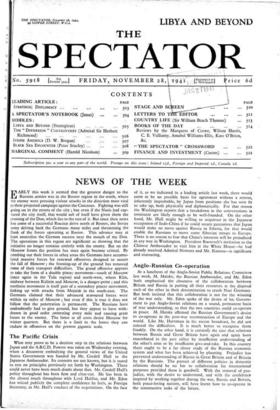The Pacific Crisis
What may prove to be a decisive step in the relations between Japan and the A.B.C.D. Powers was taken on Wednesday evening, when a document embodying the general views of the United States Government was handed by Mr. Cordell Hull to the Japanese Ambassador. Its contents are not known, but it is stated to rest on principles previously set forth by Washington. There could never have been much doubt about that. Mr. Cordell Hull's policy throughout has been firm and clear-cut. He has been in the closest touch throughout with Lord Halifax, and Mr. Eden has voiced publicly the complete confidence he feels, as Foreign Secretary, in Mr. Hull's conduct of the negotiations. On the face of it, as we indicated in a leading article last week, there would seem to be no possible basis for agreement without a retreat, inherently improbable, by Japan from positions she has seen fit to take up, both physically and diplomatically. For that reason the Washington reports that a breakdown in the conversations is imminent are likely enough to be well-founded. On the other hand, Mr. Hull might be willing to acquiesce in the Japanese occupation of Indo-China if he could secure guarantees that Japan would make no move against Russia in Siberia, for that would enable the Russians to move some Siberian troops to Europe. There is no reason to fear that China's interests will be prejudiced in any way in Washington. President Roosevelt's invitation. to the Chinese Ambassador to visit him at the White House—he had already received Admiral Nomura and Mr. Kurusu—is significant and reassuring.


























